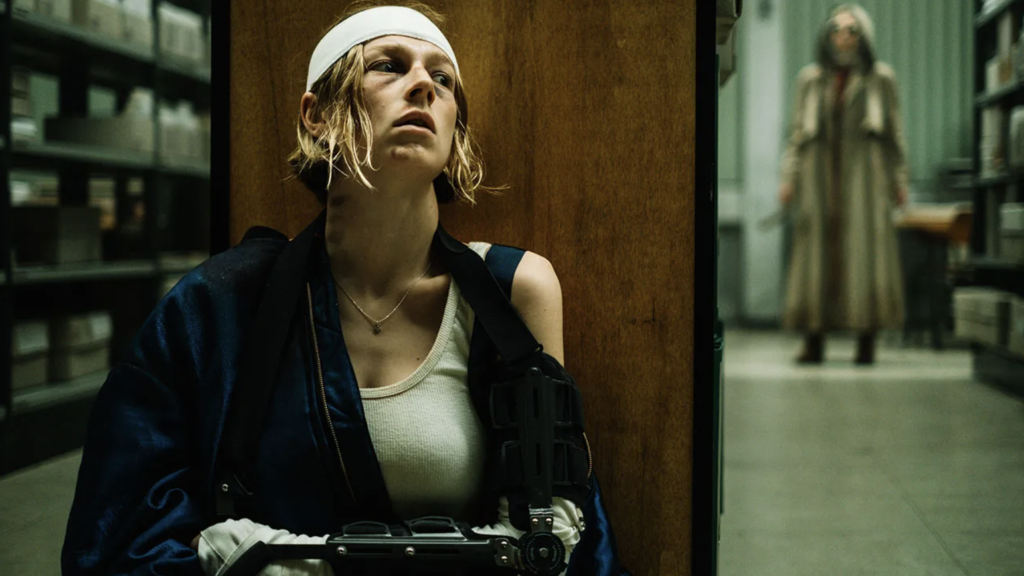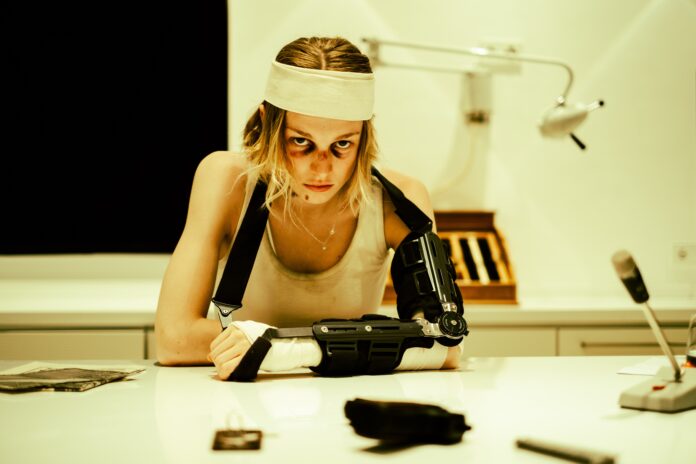“Cuckoo,” written and directed by Tilman Singer, is a wonderfully unsettling horror film. The sound design is magnificent. Much of the action is peppered with blood-curdling shrieks — sometimes from an undisclosed source. But the visuals are distressing, too. Ears twitch, blood flows up a face into an eye. Even weirder, characters have sudden, unexpected “seizures” that cause scenes to be repeated, as if time is arrested and restarted and restarted again. There are also moments where people vomit suddenly. What exactly is going on here?
The story has Gretchen (trans actress Hunter Schafer) arriving reluctantly in the Bavarian Alps with her father, Luis (Marton Csokas), her stepmother, Beth (Jessica Henwick), and their young daughter Alma (Mila Lieu), the latter of whom uses sign language to communicate; she is never seen speaking. The family dynamic is not great, as Gretchen’s father has little time or patience for her — especially after she gets injured or in trouble.
And both injury and trouble come soon after Gretchen takes a job in the local resort run by Luis’s friend, Herr König (Dan Stevens). When she ignores the risk of not biking home alone at night, Gretchen gets quite a shock in one of the film’s scarier set pieces.
“Cuckoo” is a slow-burn thriller. Singer introduces the “monster,” a hooded woman (Kalin Morrow), early on. Gretchen first encounters her in a public bathroom where she is violently trying to open the stall door. This nerve-jangling moment sets the tone for the film, which gets increasingly more intense as the story unfolds. Why the monster is after Gretchen provides the film with its central mystery.
While “Cuckoo” features violent scenes — Gretchen’s weapon of choice is a switchblade, which she wields with authority and uses it at opportune moments — the film is rarely gory. The startling moments are generated more by sound and image than by action. Shadows are used in ways that might induce goosebumps (as in the don’t bike home at night episode), and a shootout is more nail-biting than bloody. There is also a nifty sequence involving Gretchen playing cat-and-mouse with the hooded woman that may have viewers holding their breath.
Singer’s talent is that he unnerves audiences by building the suspense slowly, then unleashing the terror quickly. When Gretchen is in a heightened state of anxiety and fear, she often makes an error and suffers a painful setback, like cutting her head. (Cue ugly closeup of her wound being stapled.) It is agonizing, but as Gretchen fails, viewers become more invested in her.
As the hooded woman continues to make appearances in the film, frightening Gretchen, the question arises — is she real, or a figment of Gretchen’s imagination? “Cuckoo” does suggest a reading of mental illness, but it could also be Gretchen’s way of coping with trauma. (She suffers traumas repeatedly over the course of the story.) But as the truth is revealed, it is also clear that much is not what it seems. This ambiguity is why “Cuckoo” is so compelling.

The film also shrewdly presents disability. In addition to Alma’s condition, which is diagnosed as a possible form of epilepsy, Gretchen has a series of accidents that leave her head bandaged and her arm in a sling. Her vulnerability actually makes Gretchen stronger. Watching her hold her switchblade between her teeth, as she does in one taut sequence, is particularly badass.
Gretchen’s emotional despair may be alleviated when she meets two strangers at the resort. First, Ed (Àstrid Bergès-Frisbey), checks in and her lingering touch of Gretchen’s hand suggests a sexual interest. The two women are seen kissing later, and Ed hopes to take the itching-to-leave Gretchen away with her. Gretchen also develops a connection with Henry (Jan Bluthardt), a policeman who wants her to secretly help investigate what is going on at a bungalow at the resort. But can either of these individuals be trusted?
Singer creates a palpably menacing atmosphere in presenting the answers. The cinematography is stylish, with rich, deep colors on display in the lurid interior of a resort bungalow and there is a cool, antiseptic feel of a swimming pool turned makeshift bedroom used for nefarious purposes.
“Cuckoo” does make a few missteps. Singer gilds the lily a bit with his bird references, overworking the metaphor of the title. And Luis’ character is underdeveloped. No disrespect to Marton Csokas, who delivers a fine, albeit one-note performance, but his character is given little to do other than look or act angry.
In contrast, Hunter Schafer gives a remarkable, multilayered performance, often expressing Gretchen’s complicated and conflicting emotions without dialogue. She conveys Gretchen’s gritty determination well as she finds ways to survive. Her most poignant scene has her playing guitar in her bedroom, being truly herself in this moment — until it is spoiled by Alma’s presence. But a later exchange Gretchen has with Alma shows her growth. Schafer makes her sullen teen ingratiating and viewers will be rooting for her.
In support, Dan Stevens alternates between being campy and creepy. He makes the simple German phrase “Guten Tag,” (“Good Morning”) sound sinister and is both amusing and disturbing. And when he takes out a wooden recorder and plays it, it is equally absurd and eerie. But his character and his motivation seem a bit far-fetched, which strain credibility.
Nevertheless, Singer has created an effective, well-crafted puzzle box. The filmmaker’s skill is using the aural and visual clues to communicate tension and unease. This, along with Schafer’s flinty performance make “Cuckoo” an effective, knotty thriller.

